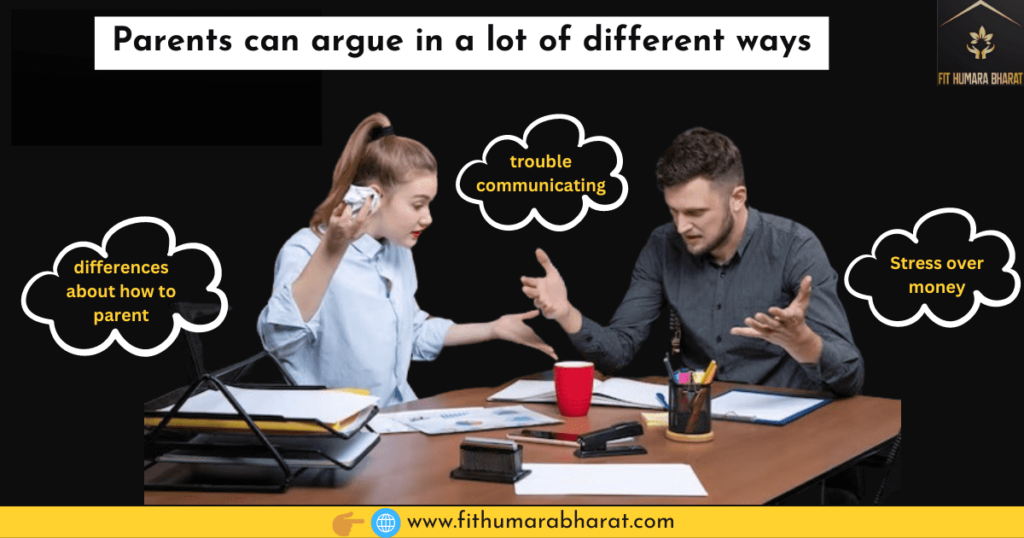There will almost always be fights and arguments in the family. Kids hear and are touched by these arguments all the time- like how they feel, how smart they get, their social-emotional intelligence, and how they behave with other people.
Dear Papa-Mumy, this is a very important topic to help shape you children's & society future. Read this blog and share with other 👇
How Parental Conflict Works:
You need to know how family works conflict, before you can talk about the effects. We say that damaging conflict is when parents or other people important to the child fight in a way that is bad for the kid.
Parents can argue in a lot of different ways, from having quiet disagreements to getting into fights.
- Stress over money,
- Differences in parent style
- Poor communication or misunderstandings
- Disputes over chores, household tasks
- Work-life balance
- Disagreements with extended family members or interference from in-laws can strain the relationship between parents
- Personal issues, like health problems, insecurities or unresolved emotional issues
- External issues like job loss, relocation, legal issues
- Differences in values or beliefs
- Past unresolved conflicts
No matter what makes a parent argue, how they handle it has a BIG IMPACT on how their kids see and respond to it!!!

Children having feelings of chaos:
It’s easy for kids to feel what their homes do to them. Moms and dads often feel a lot of different emotions at once when they fight, like fear, worry, confusion, and sadness. Seeing guardians fight can make them feel dangerous because they depend on those guards to keep them safe and stable. Younger kids may not understand why adults don’t agree. It can make them feel useless and leave them open to harm.
The stress can make kids think they’re to blame for their parents’ fights, even if the fights aren’t meant for them.
Create this as an examples for children on “How to Act”:
Parents are the most important part of every child’s life. They shape their children what they think, believe, and do. So, the way parents settle arguments sets a good example for their kids. When disagreements are settled in a healthy way through open communication, cooperation, and understanding; children learn important skills for how to deal with fights with other people.
On the other hand, having a lot of hot arguments can make people more likely to act violently or destructively. It can cause more problems in further relationships.
Parents conflicts for Kids:
When kids see family fights for a long time in their house, it can be bad for their mental health.
As per research it shows that kids who see their parents fight a lot are more likely to have a number of mental health issues. There can be depression, anxiety, and low self-esteem.
The stress they feel from parents fighting all the time can make it harder for them to handle their feelings and deal with problems. This can make them more likely to develop mental illnesses later in life.
Disagreements that aren’t solved can also cause family members to become angry and hate each other. It is a scary situation that is bad for kids’ mental health.
Children in School and Brain Growth:
Parental fights can make kids unhappy by causing problems like not doing well in school and brain development that is late. It might be harder for people who are constantly stressed and fought with to concentrate, learn, and remember things. Also, kids may find it harder to make choices and solve problems when their parents fight.
When there are a lot of fights at home, kids might become too alert and worry about the next fight all the time instead of learning or doing other smart things.
Children relationships with other people:
Kids usually learn how to get along with others by seeing how well they get along with their own parents. If kids see their parents talking to each other and working out their differences in a healthy way, they are more likely to form relationships based on confidence, respect, and empathy.
On the other hand, being around bad things like violence and anger can change how they think about relationships, making it harder for them to form close bonds as adults. When kids grow up in places where there is a lot of stress. They might find it hard to be close to others, set boundaries, or act in ways that are either not friendly or mean with others.
Ways to deal with Parent conflicts:
Even though it’s bad when parents fight and kids are flexible to change quickly. Here are some tips that ight help both parents & specially kids.
Tips for Parents:
Here are some tips for parents to manage their conflicts in a way that minimizes the impact on their children:
1. Keep disagreements private:
Avoid arguing or discussing sensitive topics in front of your children. Choose a time and place where you can have discussions away from their presence.
2. Maintain respectful communication:
Use calm and respectful language when discussing disagreements. Avoid name-calling, yelling, or using aggressive language that can escalate the conflict and create distress for your children.
3. Model healthy conflict resolution:
Demonstrate positive conflict resolution skills, such as active listening, compromise, and problem-solving, in front of your children. Show them how disagreements can be resolved peacefully and constructively.
4. Take breaks when needed:
If tensions escalate during a disagreement, it’s okay to take a break and revisit the conversation later when emotions have cooled down. This prevents arguments from escalating and provides time for both parties to reflect on their thoughts and feelings.
5. Focus on finding solutions:
Instead of dwelling on past grievances or assigning blame, focus on finding solutions to the current issue at hand. Collaborate with your partner to identify common goals and work together towards resolving conflicts.
6. Validate your child’s feelings:
If your children are aware of the conflict, acknowledge their feelings and reassure them that they are not responsible for the disagreement. Offer support and comfort to help them cope with any distress they may be experiencing.
7. Create a sense of stability:
Maintain a sense of routine and stability in your children’s lives, especially during times of conflict. Consistency can help them feel secure and reassure them that they are loved and supported.
8. Seek support if needed:
If conflicts persist or if you’re struggling to manage disagreements effectively, consider seeking support from a couples counselor or therapist. Professional guidance can help improve communication, strengthen your relationship, and reduce the impact of conflicts on your children.
9. Prioritize your relationship:
Remember that your relationship with your partner sets the foundation for your family dynamics. Make time to nurture your relationship outside of parenting responsibilities and prioritize open communication and mutual respect.
10. Practice self-care:
Take care of your own mental and emotional well-being to better cope with stress and conflicts. Engage in activities that help you relax and recharge, such as exercise, hobbies, or spending time with supportive friends and family members. A healthier, happier you can contribute to a more positive family environment.
Tips for Children:
Here are some tips for children what to do during their parent conflicts:
1. Stay calm:
When faced with a conflict, try to remain calm and composed. Take a deep breath and think before reacting impulsively.
2. Express emotions constructively:
It’s okay to feel upset or frustrated, but try to express your emotions in a healthy and constructive manner. Use “I” statements to communicate how you feel without blaming or accusing others.
3. Listen actively:
Practice active listening by paying attention to what the other person is saying without interrupting. Try to understand their perspective and validate their feelings, even if you disagree with them.
4. Use problem-solving skills:
Instead of resorting to arguments or fights, focus on finding solutions to the problem at hand. Brainstorm ideas together and be open to compromise.
5. Take responsibility for your actions:
If you’ve made a mistake or contributed to the conflict, take responsibility for your actions and apologize if necessary. Acknowledging your role in the conflict can help de-escalate tensions and promote forgiveness.
6. Set boundaries:
Establish clear boundaries for acceptable behavior during conflicts, such as avoiding name-calling, yelling, or physical aggression. Respect each other’s boundaries and take breaks if needed to prevent conflicts from escalating.
7. Seek help when needed:
If you’re unable to resolve a conflict on your own, don’t hesitate to seek help from a trusted adult, such as a parent, teacher, or counselor. They can offer guidance and support in finding a resolution.
8. Practice empathy:
Put yourself in the other person’s shoes and try to understand their perspective. Showing empathy can foster understanding and compassion, even in the midst of a disagreement.
9. Focus on the bigger picture:
Remember that conflicts are a natural part of relationships, but they don’t define them. Instead of dwelling on the conflict, focus on the positive aspects of your relationship and the things you appreciate about each other.
10. Take care of yourself:
Prioritize self-care by engaging in activities that help you relax and recharge, such as hobbies, exercise, or spending time with friends. Taking care of yourself emotionally and physically can help you better cope with conflicts and maintain healthy relationships.
The intelligent thing to do when your parents fight is to stay out of it. Like, go to a different room in the house or outside. Their fight is going on, and it’s not your job to step in and settle it!
Tell your parents how upset you are about their fight after things have calmed down.
Thank You🙏
- Parent–Child Conflict and Early Childhood Adjustment in Two-Parent Low-Income Families: Parallel Developmental Processes
- Interparental conflict, children’s security with parents, and long-term risk of internalizing problems: A longitudinal study from ages 2 to 10
- The Association of Family-Related Adversity With Fighting in Adolescents: Does Hopelessness Mediate This Association?
- The Relationship between Parent-Child Conflict and Adolescent Antisocial Behavior: Confirming Shared Environmental Mediation
- The Association between Parent-Child Conflict and Adolescent Conduct Problems over Time: Results from a Longitudinal Adoption Study

